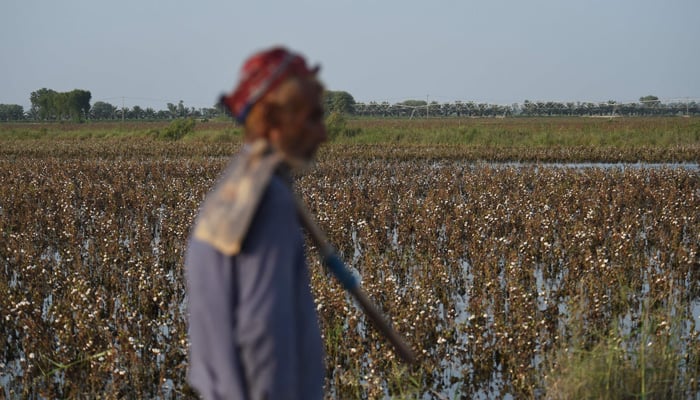Pakistani textile owners rush to secure cotton from international markets
Pakistan has to arrange cotton at the lowest cost possible on an emergency basis for the textile sector to continue meeting orders
September 13, 2022

- Textile millers concerned about meeting export orders.
- APTMA delegation off to Tanzania to secure cotton supplies.
- 36% of the crop that was expected this year has been detsroyed.
LAHORE: Worried about the unavailability of cotton after floods destroyed crops across the country, the Pakistani textile millers have started approaching international suppliers to source silver fibre to maintain the export momentum.
Pakistan has been hit by the worst flood in its history, affecting 33 million people and inflicting an estimated loss of nearly $10 billion in infrastructural damages.
Floods have destroyed the cotton crop in a fairly large area. The current estimates of cotton losses are 3.5 million bales which are 36% of the crop that was expected this year, valued at $1.5 billion.
Speaking to The News, Abdul Rahim Nasir, Chairman of All Pakistan Textile Mills Association (APTMA), said, “as we are facing a shortage of cotton in the domestic market due to multiple factors including devastating floods, we need to get cotton from across the world with a view to meeting export orders.”
The APTMA chief mentioned that surplus cotton is available in a host of countries.
Tanzania, he said, is one of the leading producers of good quality lint, so they are not only interested in imports but also want to learn from their experience of producing quality fiber.
An APTMA delegation comprising Dr Gohar Ejaz, Fawad Mukhtar and Anwaar Ghani has left for Tanzania.
Pakistan has to arrange this cotton at the lowest cost possible on an emergency basis for the sector to continue meeting the export orders. Any delay or non-delivery of export orders would further worsen the balance of payments, which was already under extreme pressure.
At the same time, the industry would lose hard-earned international clients, according to the textile body.
Coming back to the dilemma of stagnating output of cotton in the country, the APTMA chairman admitted to being wary of cotton research and development in the country.
“Unfortunately, our institutions have not been able to contribute to abundant production of quality cotton in the country. Despite spending billions of rupees every year, we have failed in developing high-yielding, disease-resistance cotton varieties,” he said.
Regrettably, one of the reasons for the cotton fiasco has been low allocation for research and development of new seeds, he said, adding that Pakistan needs to forge partnerships with leading global technology giants in the field of agriculture R&D for introducing quality cotton seeds in the country like several top cotton producers in the world did in the past.
In the last couple of decades, China, India, Australia, Uzbekistan and Somalia introduced quality cotton seeds through major developers.
“In contrast, we have allowed mushrooming of seed companies involved in low-quality cotton seeds under an unregulated marketing system. We need to pull our socks and only allow those seed companies that have infrastructure, know-how and gene pool for developing superior quality cotton seed,” he stressed.









